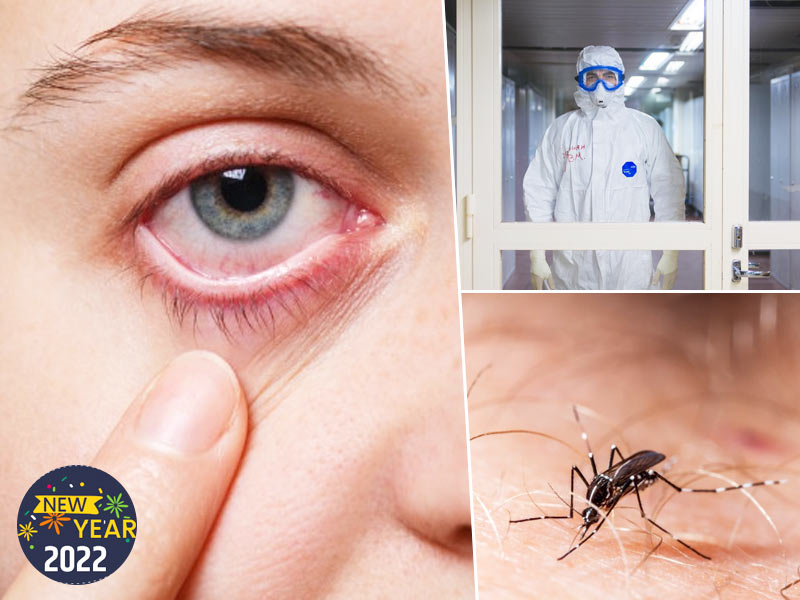
The year 2021 is swiftly coming to an end. For India, this year saw fewer ups than downs. This is especially true as far as health is concerned. The country was hit by a massive second wave of COVID-19, which saw lakhs of people getting diseased and thousands perishing in a matter of days. But COVID wasn’t the only disease to roil India this year. As we are wrapping up with 2021, let us take a look back at diseases that hit India this year.
Table of Content:-
Second COVID Wave In India

(Photo Credit: Unsplash)
If there is one thing 2021 will be remembered for concerning India, it will probably be the second wave of COVID-19 that hit in March and continued through March.
- During this period, India did not only have millions of active COVID cases but also surpassed Brazil in terms of the total number of deaths, standing second only after the United States.
- On May 5, it saw a record 412,432 cases, the highest in the world.
- Not only that, on June 10, a staggering 6,148 deaths were reported.
- Such a high number of single-day COVID cases and deaths weren’t the only things the country witnessed, the second wave-exposed the weakness of our health infrastructure to the bones.
- Helpless queues were witnessed to get a hand on medical oxygen as hospitals made desperate SOS calls for medical oxygen.
- Diseased people and their relatives were also seen outside hospitals awaiting admission, as there was a major shortage of hospital beds.
Looking at these facts, the statement made by a think tank was probably right that the second wave was the worst human tragedy this country saw since partition (in 1947).
Also read: From Vaccine Rollout, 2nd Wave To Omicron Variant: How India's COVID Situation Panned Out In 2021
Mucormycosis

(Photo Credit: Freepik)
During the second COVID wave, a mystery disease also ravaged India.
- Mucormycosis, commonly known as black fungus, infected tens of thousands of people across India, most of them recovering or recovering coronavirus patients.
- An extremely rare infection, mucormycosis affects the eyes, sinuses, and lungs.
- In extreme cases, the eyes of many patients had to be removed to prevent the disease from spreading to the brain.
- The rarity of the disease is such that very few cases were reported in recent years.
- However, 2021 was no ordinary year as 45,432 mucormycosis were reported in India till July 15, as informed by Union Health Minister Mansukh Mandaviya to the Rajya Sabha.
- The disease was seen often among diabetics, immunocompromised people, and those who had an underlying health issue.
Such a situation was only witnessed in India, as no other country saw such a close relation between COVID-19 and black fungus.
Leptospirosis In India
Quite an unknown disease, cases of leptospirosis were reported in the city of Mathura, Uttar Pradesh.
- Leptospirosis is a rare bacterial infection caused by leptospira.
- It spreads to humans from animals’ urine. It can also spread through water and soil.
- The bacteria cause both mild and severe illness and in extreme cases can even lead to death.
- Cleanliness workers, veterinarians are more exposed to this disease.
- It’s more common in India’s suburban regions where sanitation is poor.
Zika Virus Outbreak In India

(Photo Credit: Freepik)
As the year was coming to an end, India witnessed an outbreak of the Zika virus, which is associated with shrunken heads among newborns and also causes Guillain-Barre syndrome, a rare disorder in which the body’s immune system attacks the nerves.
- The city of Kanpur in Uttar Pradesh saw a massive outbreak of the Zika virus.
- Cases were reported among pregnant women too, a matter of concern since it leads to shrunken brains among newborns.
- However, the outbreak was eventually contained.
Also read: After Pfizer, Moderna's COVID Vaccine Shows Lowered Efficacy Against Omicron: Study
So, as you saw, 2021 was a grim year for India as far as health is concerned. Not just COVID, the country was roiled by several diseases. The situation hasn’t abated yet, as there is fresh concern around the Omicron variant of COVID-19, which is said to be highly transmissible. India has reported over 100 Omicron cases. It has brought the efficacy of vaccines into question, as reports suggest that the strain is capable of escaping the immune response generated by vaccines. So, it’s better to take precautions. Hence, mask up, practise social distancing, get vaccinated, and avoid unnecessary crowding.
Photo Credit: Unsplash, Freepik
Also watch this video
How we keep this article up to date:
We work with experts and keep a close eye on the latest in health and wellness. Whenever there is a new research or helpful information, we update our articles with accurate and useful advice.
Current Version